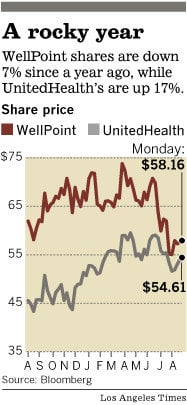Complaints about WellPoint chief Angela Braly have intensified since last month's disappointing earnings news. The health insurer says recent deals Braly orchestrated put it on track for growth.
 Investors in health insurance giant WellPoint Inc., which runs Anthem Blue Cross in California, are pressing for a change in top management as criticism intensifies about the company's lagging stock, managerial missteps and disappointing earnings.
Investors in health insurance giant WellPoint Inc., which runs Anthem Blue Cross in California, are pressing for a change in top management as criticism intensifies about the company's lagging stock, managerial missteps and disappointing earnings.
Shareholder complaints about WellPoint's chairwoman and chief executive, Angela Braly, have grown louder since last month, when the Indianapolis company posted another anemic quarter and cut its full-year profit outlook as its enrollment fell again.
The investor unrest follows years of consumer fury that beset WellPoint as it repeatedly raised premiums on many families and small businesses by 10% or more. The nation's second-largest health insurer runs Blue Cross plans in California and 13 other states and has more than 33 million customers nationwide.
A New York hedge fund, Royal Capital Management, sent a letter to WellPoint's board last week saying that Braly has "failed miserably" as CEO and that "it is incumbent upon the board of directors to fulfill its fiduciary responsibility to shareholders by changing leadership." Royal Capital held about 838,000 shares of WellPoint as of June 30. It declined to comment further Monday.
Other influential WellPoint shareholders, such as Leon Cooperman's Omega Advisors hedge fund in New York, have expressed similar concerns about the company's lackluster performance, particularly compared with its chief competitors', and they have urged the board to replace Braly.
"WellPoint has certainly lagged behind its peers," said Ana Gupte, a healthcare analyst at Sanford C. Bernstein. "This is not an easy challenge for them to overcome."
Investor patience is running short. WellPoint's stock has dropped 29% since Braly, 51, took over as CEO in June 2007. For the same period, shares of UnitedHealth Group Inc., the country's biggest health insurer, are essentially flat. In the last year, UnitedHealth shares have rallied 17%, while WellPoint shares have fallen 7%. WellPoint's stock rose 0.9% to $58.16 in trading Monday.
WellPoint acknowledged that mistakes have been made at times in setting premiums and managing medical costs, which have rattled investor confidence. But it said recent acquisitions orchestrated by Braly have put it on track for future growth. For instance, WellPoint agreed last month to buy Medicaid insurer Amerigroup Corp. to boost its presence in the fast-growing segment of government health plans for the elderly, disabled and poor.
"We are meeting with our shareholders to understand their views and share what we are doing to move the company ahead," WellPoint spokeswoman Kristin Binns said. "These are challenging times for many companies in the managed-care field, but we believe we are well-positioned to win in the market."
So far, WellPoint's board has voiced strong support for Braly. "The board has been fully involved in the strategy WellPoint is pursuing and is supportive of the strategy and our management team," Jacquelyn Ward, the firm's lead outside director, said in a statement last month after analysts began questioning management's performance.
WellPoint's annual revenue grew 3% last year to $60.7 billion, but its net income dropped 8% to $2.65 billion.
Braly has had a rocky tenure at the helm of WellPoint, and some missteps in California have played a major role. The corporate lawyer and Dallas native joined WellPoint in 2005 when the company bought a Missouri Blue Cross insurer where she was CEO.
Analysts say some investors weren't pleased with Braly's promotion to WellPoint CEO in 2007 because she was known more as a deal maker and lacked experience running a large insurance company.
Then, in 2010, WellPoint tried to raise rates as much as 39% in California, sparking national outrage and helping President Obama win support for his healthcare overhaul. At one point, Braly accused Obama of spreading false information about the company's treatment of cancer patients. The Anthem Blue Cross unit had to back down after it could not justify the California rate hikes; it accepted maximum increases of 20% instead.
"Braly has presided over the most arbitrary and capricious health insurance rate hikes of our time," said Jamie Court, president of Consumer Watchdog, an advocacy group in Santa Monica. "Now she is learning the rules of Wall Street: Cross policyholders all you want, but don't step on the wallets of shareholders."
Another miscue came last year in Northern California, where higher-than-expected claims in a Medicare plan hurt earnings and surprised Wall Street. WellPoint let down investors again last month, posting an 8% drop in second-quarter profit.
Some analysts give Braly high marks for the Amerigroup deal and last year's acquisition of Cerritos-based CareMore Health Group. Braly has been bullish about the growth prospects for CareMore, which runs Medicare plans and clinics specializing in assisting seniors with higher medical needs.
Both deals help WellPoint diversify beyond its core business customers, where enrollment has been declining, and enable it to better compete for more government business through Medicaid and Medicare.
"I think the company is moving in the right direction based on those two acquisitions," Gupte said. "Now it's about the execution."
Contact the author at: [email protected]





